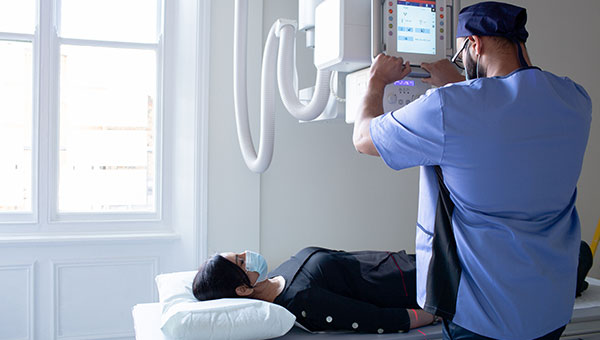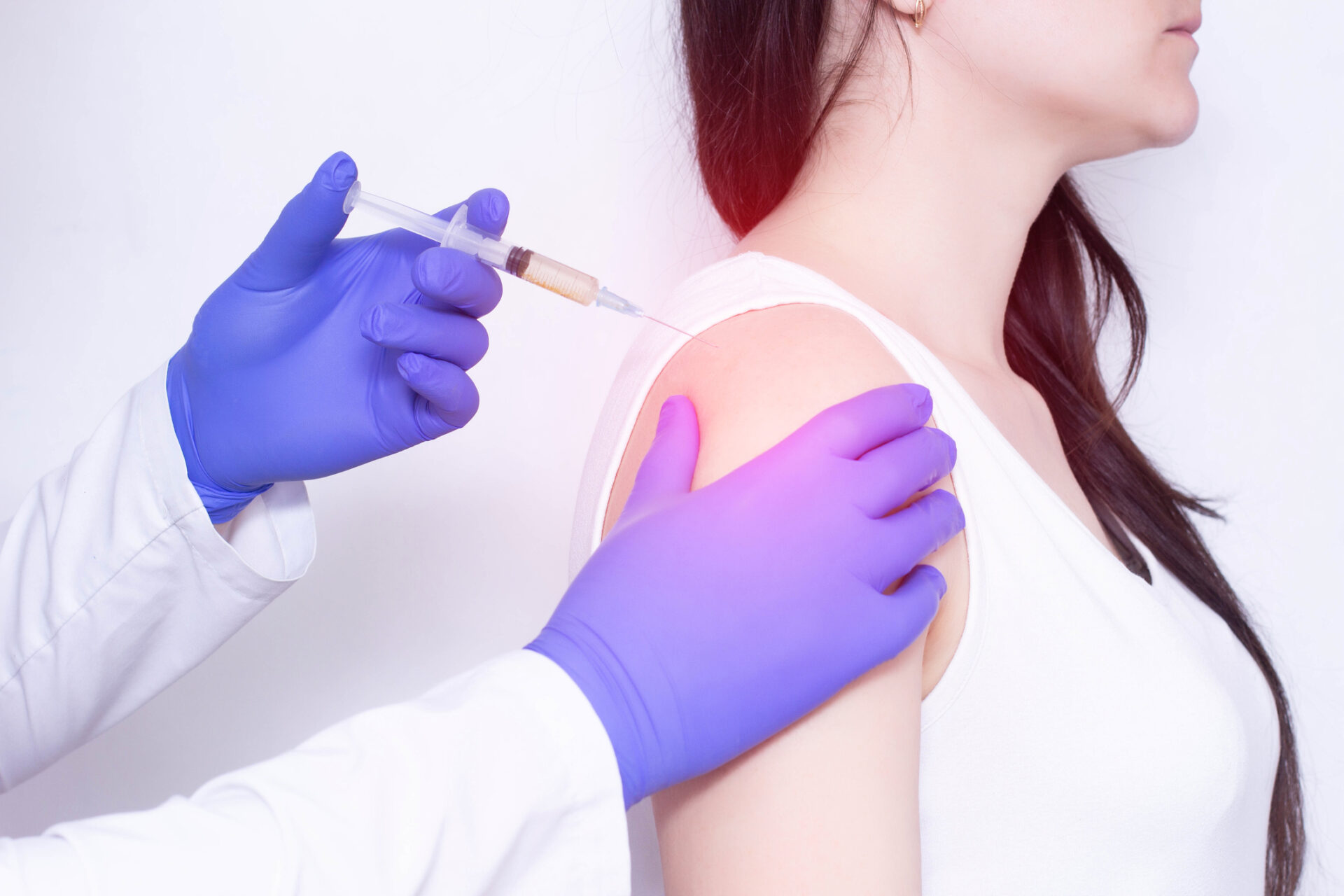Shoulder pain affects up to a third of people at some point in their lives [1]. In fact, it’s the third most common musculoskeletal problem reported to GPs, after back and neck pain.
Cortisone injections for shoulder pain can help alleviate uncomfortable symptoms stemming from many different shoulder problems. From arthritis to sports injuries, shoulder cortisone injections can reduce swelling and inflammation, relieving pain around the shoulder joint.
Here, you’ll learn all you need to know about cortisone injections for shoulder pain, including:
- Which shoulder pain conditions cortisone injections can treat.
- How cortisone injections in the shoulder work.
- Results and side effects of cortisone injections for shoulder pain.
Table of Contents
- What causes shoulder pain?
- What shoulder conditions can cortisone injections treat?
- How do cortisone injections work in the shoulder?
- How successful are cortisone injections in the shoulder?
- How long does it take to recover from shoulder cortisone injections?
- How long does a cortisone shot last in the shoulder?
- Side effects of shoulder cortisone injections
- Where to get shoulder cortisone injections
- Shoulder cortisone injections: FAQs
What causes shoulder pain?
A number of shoulder and elbow conditions can lead to pain and discomfort in the upper arm, including arthritis, frozen shoulder, and tendonitis.
Many shoulder conditions can be treated with steroid injections like cortisone. However, before you start treatment, you need a medical diagnosis.
At Harley Street Specialist Hospital, we work with the largest pool of pain management consultants in the UK, so you can often get a diagnosis and treatment on the same day when you book an appointment with our medical team.
What shoulder conditions can cortisone injections treat?
Here are some of the most common shoulder complaints that can be treated with cortisone injections.
1. Frozen shoulder
Long-term stiffness in the shoulder is sometimes known as frozen shoulder (or adhesive capsulitis in clinical terms). This happens as a result of inflammation in the tissue around the shoulder joint.

Several studies have shown that cortisone injections for frozen shoulder can provide effective short-term pain relief and increase your range of motion [2-4]. One study found that combining steroid treatment with physiotherapy was more effective than physiotherapy alone for frozen shoulder [4].
2. Bursitis
Shoulder bursitis happens when the bursa (fluid-filled sacs) around your shoulder joint start to become inflamed. The shoulder may feel tender, swollen, or warm to the touch, and you’ll often experience a dull pain in the area.

Research shows that a 40 mg corticosteroid injection treatment administered once a week for two weeks can relieve pain from shoulder bursitis [5].
3. Arthritis
Cortisone injections are a common treatment for easing pain and stiffness caused by arthritis [6-7]. While they can’t repair the degraded cartilage around your shoulder joint, cortisone injections may reduce any painful swelling.

4. Non-specific shoulder pain
Steroid injections may help relieve discomfort even if you don’t have a specific diagnosis for your shoulder pain. One study found steroid injections were superior to physiotherapy and manual manipulation for general shoulder pain [8].
Which shoulder conditions can’t be treated with cortisone injections?
Cortisone injections may provide some relief for conditions including rotator cuff syndrome and rotator cuff tendonitis, but no more significant relief than nonsteroidal anti-inflammatory drugs (NSAIDs), or even placebo drugs in some cases [1].
If you have rotator cuff syndrome or a related problem, you may need to seek an alternative shoulder and elbow treatment.
How do cortisone injections work in the shoulder?
Like most steroid injections, cortisone injections work by minimising your immune response to an injury, sprain, or strain in your shoulder joint. Your immune system can cause excessive inflammation around the joint, which leads to pain and swelling.
Ultrasound guided cortisone injections for shoulder pain allow your clinician to locate the specific area for treatment before the steroid is given. Ultrasound waves indicate the inflamed areas:

With ultrasound-guided injections, clinicians can give you a lower dose of cortisone in the exact area of discomfort, reducing the risk of side effects while still eliminating pain.
How successful are cortisone injections in the shoulder?
Cortisone and other steroid injections in your shoulder can offer some pain relief and range of motion improvements, at least in the short term [1-8].
One study investigating 50 mg hydrocortisone injections for frozen shoulder pain said more than half of patients reported a 75-100% improvement in their symptoms. A further quarter said symptoms had improved by at least 25% [9].
Corticosteroids can also be combined with other treatments like exercise and physiotherapy for faster recovery [10].
How long does it take to recover from shoulder cortisone injections?
You’ll need to rest after cortisone injections for a couple of days to give the medication time to work, and stop the bloodstream or other tissues absorbing the steroid (this can lead to complications — learn more about the dark side of steroid injections). However, if you’re feeling well, you can start to get back to normal after one to two days.
You should still rest your shoulder joint for at least seven days in total. Don’t lift heavy weights (or shopping bags), and minimise movement in the affected arm.
How long does a cortisone shot last in the shoulder?
Cortisone injections can offer shoulder pain relief for up to six months [1]. You can have top-up injections no more than every three months if needed.
A planned programme of injections, physiotherapy, and other pain relieving strategies can help your shoulder joint heal, minimising the need for injections in future.
Side effects of shoulder cortisone injections
The most common side effects of a shoulder steroid injection include [1-2]:
- Pain, swelling, or bruising in the injection site.
- Flushed face.
- Irregular periods in women.
- Rash.
- Headaches.
These side effects are almost always temporary, but if you’re concerned, speak to your doctor or clinician.
Most people have only mild side effects, especially if they take time to recover after an injection, as this reduces the risk of cortisone being absorbed into the blood.
But in some cases, you may have a more severe reaction to cortisone injections. More serious side effects include:
- Symptoms of depression and/or anxiety.
- Mood swings.
- Hallucinations (visual or auditory).
- Fever and other symptoms of infection (such as an extremely sore throat, chills, pain when urinating, or mouth sores).
- Excessive sleepiness or confusion.
- Rapid breathing.
- Puffy face and/or unexplained weight gain.
- Swelling, throbbing, and/or discolouration of the arms or legs.
- Vision changes.
Request an urgent appointment with your doctor if you have any of these symptoms, as they may indicate a more serious condition resulting from cortisone injections.
Where to get shoulder cortisone injections
It’s not always possible to get cortisone injections on the NHS. In addition, waiting lists and referral times can be lengthy.
If you’re looking for fast, accessible private cortisone injections to ease your shoulder pain, book an appointment at Harley Street Specialist Hospital. We cater for self-pay patients and those with private medical insurance, so you won’t need to wait for treatment — in many cases, shoulder cortisone injections can be administered the same day as your assessment following diagnostics and imaging.

Shoulder cortisone injections: FAQs
Find out more about shoulder cortisone injections in these frequently asked questions.
Are shoulder cortisone injections painful?
Cortisone injections can be uncomfortable for a couple of days after the medication is administered. To minimise your discomfort, the area will be numbed with a local anaesthetic.
After a few days, you’ll find you have much less shoulder pain than before the injection.
How soon can I exercise after a cortisone injection in my shoulder?
You can start exercising again 24 hours after a shoulder cortisone injection, but you should stay away from weights and shoulder/arm exercises for at least seven days (unless your doctor says you can start sooner).
Can I drive after a cortisone injection in my shoulder?
Local anaesthetic in your shoulder may make your arm weaker than usual, and prevent you getting a firm grip on the steering wheel. We advise that you bring someone with you to your appointment so you don’t need to drive home after your treatment.
You can start to drive as soon as the feeling and strength in your arm returns to normal.





